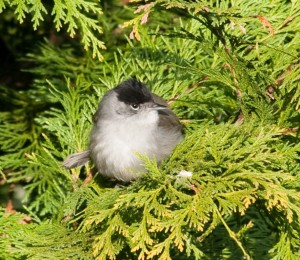Someone has stolen all the robins and thrushes! It occurred to me the other day that I no longer here the song thrush in the morning on my way to work. Then I thought a bit more and realised there were no robins either. Then one morning I woke up earlier than usual and heard the thrush (even through the double glazing – note to self, get double glazing changed). The song thrush sings just before it gets light, unfortunately I am too lazy to get up at that time once we get past February and so I miss his solo performance.
Now the tune has changed and I am treated to the calls of chaffinches, blue tits and great tits. It won’t be long before the blackcaps and chiffchaffs are adding to the chorus line. I know that chiffchaffs have been heard in the area, and I was lucky enough to have a blackcap in the garden on last Saturday (strangely enough the day after I had 5 siskins, traditionally winter visitors, on the seed feeder). I managed to catch the grumpy little chap on camera, unfortunately, though, not the siskins.

One sound of Spring that I am still missing is the sound of the frogs in the pond. Alas, I fear there will be no frogspawn this year.
Is there a sound that you particularly associate with the coming of Spring?